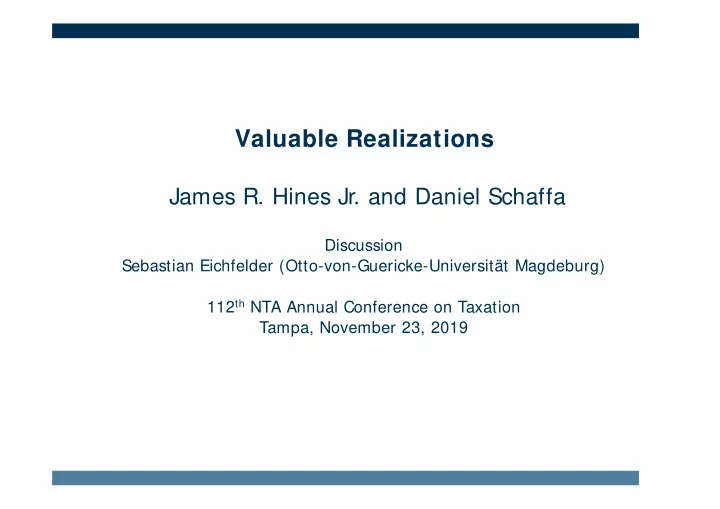

Valuable Realizations James R. Hines Jr. and Daniel Schaffa Discussion Sebastian Eichfelder (Otto-von-Guericke-Universität Magdeburg) 112 th NTA Annual Conference on Taxation Tampa, November 23, 2019
1. Summary (1) • Research question and methodology Theoretical analysis regarding the question if capital gains taxes generally create an incentive to delay realizations (see also lock-in effect) Use of partial equilibrium models with an analysis of first and second order conditions (no comparative statics, but also not needed) • Results Capital gains taxes (realization principle) create an incentive to reduce the number of realizations and to accrue unrealized gains over long periods Therefore, early realizations might also increase the value of an investment activity if this 1) reduces the overall number of realizations or 2) increases the length of periods to accrue unrealized gains over the whole investment cycle Sebastian Eichfelder 2/17
1. Summary (2) • General remarks Interesting contribution: the paper clarifies that CGT not always delays realizations and how investors optimally react to CGT to maximize the value of their investments → buy-and-hold strategies are useful! The analysis is straightforward and the conclusions are clear → letter format paper could fit well (if analysis is not extended) Paper writing might be more concise and the contribution could be made more clear (in the introduction) Sebastian Eichfelder 3/17
2. Comments (1) • Literature W.r.t. lock-in effects, it may be useful to shortly discuss the old view (e.g., Feldstein REStud 1970) and the new view (e.g., Auerbach QJE 1979; Bradford JPubE 1981) (se also Lamont JF 1997). It might further be useful to consider the empirical literature on the impact of capital gains taxes and lock-in effects (e.g., Lang/ Shackelford JPubE 2000; Poterba/Weisbenner JF 2001; Ayers/Lefanowicz/Robinson CAR 2007; Dai et al. JF 2008; Blouin/Hail/Yetman TAR 2009) Consideration of option-based theory (Dixit/Pindyck 1994)? • Contribution / Theory Rather a carification of the literature? In a wide area of settings, a delay and an abolishment of a realization may be equivalent. Thus, early realizations should typically not be an optimal strategy. → More modest when critizising the previous literature? Sebastian Eichfelder 4/17
2. Comments (1) • Theory The paper does not consider uncertainty and transaction costs: • Uncertainty limits the ability to undertake current realizations in order to prolong future realization periods as the optimal timing for a realization cannot be anticipated; under a real options theory (e.g, Dixit/Pindyck 1994), uncertainty results in a delay of investments • Transaction costs make realizations generally less profitable and thus increase the incentive to delay or even abolish realizsations The discussion on the impact of CGTs on the incentive to invest is a little bit simple and does not fit well to the topic → Needed? • Statement that CGTs reduce accumulated cash flows is obvious • A valuation model typically requires a comparison of the investment cash flow with the market return/cost of capital (discount factor); as market returns are taxed as well, the effects become less obvious • An analysis of investment tax incentives requires a modelling of the investment decision Sebastian Eichfelder 5/17
2. Comments (1) • Applications The current applications of the paper seem to be a little bit stylized and might be unrealistic (e.g., a realization of one asset after 1 min in order to create a longer period to accrue returns of another asset → why did I not simply buy the other asset immediately?) It would be very helpful to get examples or anecdotal evidence that early realizations are valuable in real life situations (e.g., considering uncertainty and transaction costs) → a short explanation of some examples in the introduction or the conclusion might be sufficient for a letter format paper (if this is the target) Sebastian Eichfelder 6/17
Recommend
More recommend